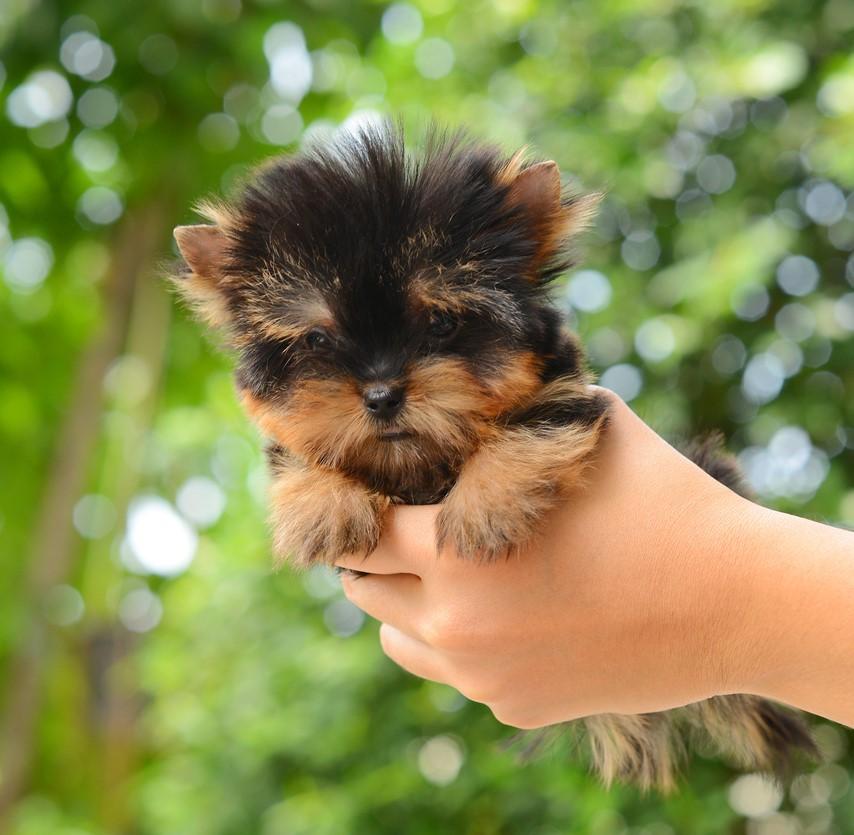What are Teacup Dogs? - Everything You Need to Know



See files for Dogs
They may look cute and practical to take out in your handbag, but these genetically modified dogs have more health problems than you may think. There are many breeds that have their version of teacup dogs, such as the Maltese, the Yorkshire Terrier and the Chihuahua. Although they may be confused with toy dogs, breeders have gone one step further to create even smaller versions of these animals. If you're thinking about getting a teacup dog, please read this AnimalWised article: What are teacup dogs? And please reflect on the facts that we're about to expose.
Definition of teacup dogs
The rise in popularity of teacup dogs came with many celebrities such as Paris Hilton who flaunted their pets around photo calls in the palm of their hands. A teacup dog can come in different breeds and bloodlines, but what defines them as such is their size and weight. A teacup dog should weigh no more than 4lbs and be less than 17 inches in height by the time they are adult dogs, i.e. 12 months of age, although these measures have not been standardized. They may be confused with Toy dogs, although toys are generally bigger in size, even though they are smaller than their average-sized counterparts.
The most popular teacup dog breeds are the following:
- Yorkshire terrier
- Spaniel
- Chihuahua
- Maltese
- Dachshund
- Beagle
- Pinscher
- Papillion
- Poodle
- Fox Terrier
- Pomerian
- Pug
- Boston Terrier
- Silky Terrier
- Burssels Griffon
- Pekingese
- Shih Tzu
In order to achieve a teacup dog, breeders mate the smallest dogs from a litter breed with other small dogs, until genetic modification of small dog breeding achieves this desired size. The purely economic purpose of this breeding and the fact that this also poses health risks makes us dig in deeper in the reasons why it's not advisable or ethical to purchase a teacup dog and, to argument AnimalWised's point of view, we'd like to highlight the following points:

Teacup dog lifespan
According to the Canine Journal[1], general inbreeding can highly reduce a dog's lifespan. In the case of inbred teacup dogs, their lifespan would be similar to their normal-sized breed version but, due to the health and psychological issues that we'll explain below, their lifespan can be decreased severely,even though small dog breeds have a higher lifespan than bigger ones.

Teacup dog health issues
The severe breeding techniques breeders use makes teacup dogs even more prone to suffering many health issues that can lead these puppies to lead quite a miserable life.
Physical health issues
- Hypoglycemia: This illness is caused by a sudden drop in blood sugar levels, hick causes weakness, lethargy, head tilting, shivering and in the worst cases even coma. The fact is that teacup dogs need to eat at least every three hours due to the small amount of food they ingest. If their feeding schedule is not carefully followed, they can easily develop hypoglycemia.
- Heart defects: Congenital diseases such as Pulmonary stenosis are more likely to appear in this type of dog due to the aggressive breeding techniques used that make them have this small size. In fact, chronic valvular disorder actually occurs in up to 40% of teacup dogs. Other heart related issues that can affect them are heart murmur, enlarged heart or dilated cardiomyopathy.
- Collapsing trachea: This issue is a genetic condition that is characterized by the obstruction of the dog's airways. This may trigger cough, trouble breathing properly and a blue color in the gums. This condition can be treated with antibiotics.
- Seizures: These seizures can appear in teacup dogs as a sign of hypoglycemia, although it way be a warning of other issues such as portosystemic shunts or hydrocephalus, two conditions which we'll talk about below.
- Breathing issues: Dyspnea and tachypnea can occur in this type of dogs. The first may occur due to overworking the respiratory system, causing noisy breathing, nostril flaring among other symptoms. On the other hand, tachypnea is described as fast breathing and causes shallower breathing than usual.
- Digestive problems: A teacup dog's internal organs will also be smaller than a normal-sized dogs, which is why it is common for their liver to have problems when flushing out toxins.
- Liver shunts: The above is precisely what can cause liver shunts in these dogs. This is a congenital disease that the dog will have from birth and do not have a very good outcome according to veterinarians as it will cause malnutrition, weakness and the dog being underweight.
- Gum disease: Their first set of teeth will not always fall on their own, this may cause inflammation and or/infection in gums and teeth.
- Patella luxation: This condition is also known as "sliding kneecap" and is a luxation of the kneecap bone that can impair the dog's walking ability and can make a dog more prone to arthritis.
- Hydrocephalus: This is a congenital brain deformity in which cerebrospinal fluid is found in the dog's skull. This will pressurize the brain, causing blindness, seizures and will cause the dog to develop a dome-like head.
- Weak bones: A teacup dog's bones throughout their bodies and head are extremely fragile, which can cause diseases such as osteoporosis or mineral deficiency, meaning they are likely to fracture them.

Psychological health issues
Apart from the physical problems mentioned above, teacup dogs will also suffer a series of psychological problems throughout their life:
- Chronic stress. As teacup dogs have fragile hearts, they do not manage stress well. This is only exacerbated by the fact that owners tend to carry them around everywhere, which further boosts their stress levels. Stress in a puppy due to a life change such as moving homes, rough playing and being alone for a long period of time can also trigger physical issues such as hypoglycemia. When left alone for too long, this type of dog may also suffer from separation anxiety and, due to their small bladders will frequently cause incontinence.
- Behavioral issues: According to a recent study at the University of Sydney[2], the combination of the dog's size, head shape and weight can affect a dog's behavior. In the case of teacup dogs, they are more prone to psychological problems such as aggressiveness and Napoleon syndrome. It's important to highlight that chronic stress causes a downfall in the dogs' defenses, which makes them prone to suffer from the diseases mentioned above.
- Learning difficulties: Excessive humanization, avoiding socialization with other bigger dogs (creating fear, that generate aggressive behavior) and their own physical characteristics (small bladder and stomach) makes teacup dogs prone to learning difficulties. This can translate in a need for the owner to make a bigger effort to teach them adequate habits.
Breeding teacup dogs
The problems with the health of teacup dogs are mainly due to harsh breeding techniques, which have been triggered by a higher demand of this type of dogs as their popularity has risen in recent years.
The fact is that many people do not have appropriate licences to breed in optimal conditions, as many have been proven to have been bred in intensive breeding farms with hardly any sanitary conditions. Moreover, breeding mothers are impregnated both at the end and at the beginning of her cycle, which means they may be born prematurely, causing even further problems.
Once they are born, puppies face malnutrition and are sold before their eight weeks of live, which is the time they need to spend next to their mother. All of this causes many of the puppies to die of several deformities and illnesses before they are even sold.
You should also take into consideration that online sales of these dogs means there is no guarantee of where they come from or if they have come from a certified breeder. Dog breeders breeding sick puppies can in fact be sentenced to jail and even heavily sanctioned for their activity[3]. Taking into account that neither the Kennel Club Association or the RSPCA approve or recognize this type of dog breeding, it is advised to refrain from purchasing a dog that is advertised with this characteristic. At AnimalWised we'd also like to add that we advocate for dog adoption and do not support the breeding industry.

The best care for a teacup dog
As you've been able to read above, the many issues that can arise in a teacup dog means you will need to take special care of them if you have for any reason have to care for one. Pay special attention to the following tips to care for a teacup dog:
Teacup dog diet
In order to avoid hypoglycemia, teacup dogs should eat three to four times a day or roughly every three to four hours. Apart from giving them a feed that's adequate to their characteristics, also add"Karo" syrup to their meals to prevent low blood sugar levels. Enrich their diet with food full of omega-3 fatty acids, minerals and vitamins.
Reduce stressful situations
It's highly important to make sure your dog does not undergo stressful situations. In order to do so, create a routine with your dog, pay special attention to them and play for short periods of time. Teacup dogs need 14 hours sleep, so make sure you help them release their energy but in small doses so they don't overwork their little body.
It is not advisable to take them with you everywhere, especially if you live in the city or are going to places the dog is not used to visiting, as all of the stimuli appearing around them may create anxiety in the dog. Create a comfortable environment for your dog at home.
Veterinary care
Under any of the symptoms mentioned above, you should take your dog to the vet immediately. Veterinary bills tend to be high in the case of teacup dogs due to the amount of times they may have to be treated throughout their lives.
Always follow the recommended vaccination schedule and visit your veterinarian on a regular basis for check-ups.
If you want to read similar articles to What are Teacup Dogs? - Everything You Need to Know, we recommend you visit our Facts about the animal kingdom category.
- Harold Herzog. "Why Do Small Dogs Have So Many Psychological Problems?" Psychology Today (2013)






 This is very helpful. I always thought that teacup puppies were non forced breed. THANKS !
This is very helpful. I always thought that teacup puppies were non forced breed. THANKS !





